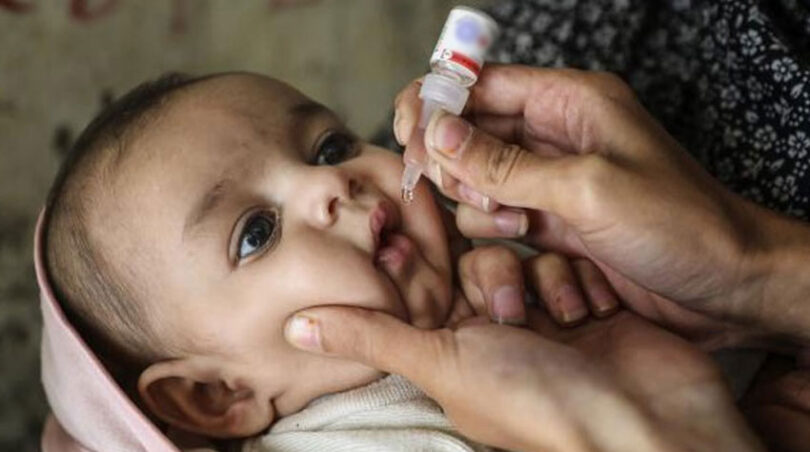A seven-day anti-polio campaign kicks start today across Sindh including mega cities of Karachi, and Hyderabad, along with far-flung desert regions in Thar Parker, Umar Kot, and Methi. According to the provincial task force on polio eradication, over 10.6 million children across the province would be immunized during the week-long drive.
The deadly poliovirus getting tougher and invincible to the resolve of the Pakistani nation as the collective efforts of successive Pakistani governments and their global partners including the UN, UNICEF, Bill and Melinda Foundation, the Rotary Club, and several other states and charitable organizations worldwide in their anti-polio endeavors over the past two and a half decades. Recently, the Type-1 Wild Poliovirus (WPV1) was detected in sewage samples collected from the Lasbela district. The genome sequencing of the virus, found in samples collected from Lasbela was matched with the poliovirus samples found in Hub and Gadap Karachi. The Health Ministry has confirmed the presence of poliovirus in environmental samples from nine districts of the country, which is of grave concern for the government as well as the public at this point. After the revelation of this shocking news, the government decided to launch a mass emergency polio vaccination campaign to deter the growing risk of polio infection in the province.
Pakistan’s continuous failure to defeat the deadly epidemic has caused a challenging and embarrassing situation for the country as a vast anti-polio infrastructure, and multiple anti-polio campaigns at frequent intervals could not produce the desired results in the past decades. Pakistan invested bulk resources, implemented various strategies, and adopted multiple measures since the country joined the global polio eradication program in early 1994. Presently, Pakistan and its first-door neighbor Afghanistan are the two nations worldwide that failed to defeat the deadly polio virus and polio continues to threaten the health and well-being of children in their countries. Unfortunately, all traditional strategies, incentives, and motivations have proved to be futile, because poliovirus is still found in densely populated urban centers and rural areas in the 21st century when our neighboring states landed on the moon and Mars, Pakistan faced defeat on its decadeslong fight against the deadly virus. There is no other reason for Pakistan’s failure except continued anti-state and anti-public propaganda and false conservativeness of parents that pose serious risks to the children’s health and cause a grave setback to national interests.
In fact, the Pakistani authorities displayed traditional slackness and unnecessary tolerance toward ongoing opposition and baseless propaganda against the polio vaccination from a particular segment of society in certain areas. Polio vaccination is a national cause not a discretionary decision of any individual or courtesy/ willingness of parents to immunize their kids from the dangerous disease. Rather, it is a binding national obligation of all citizens to get their children vaccinated so that neither their children are affected by the virus nor transmit deadly diseases to other infants in the country. Pakistani authorities have wasted much time in taking stern legal action against those who refused to cooperate with the polio teams hurting the core national interest. There is a dire need for harsh measures that have now become unavoidable to accomplish the national cause and secure future generations from polio infection. The lawmakers must pass urgent legislation reprimanding the parents resisting the polio administration of their children by introducing stern punishment such as blocking their national IDs or Bank Accounts, imposing fines, awarding imprisonment, or both. So the 100 percent vaccination of all children under 5 years of age could be ensured at all costs. Otherwise, the future of our coming generations is insecure and bleak.







